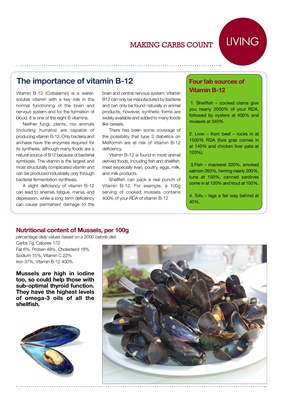
Vitamin B-12 (Cobalamin) is a watersoluble vitamin with a key role
in the
normal functioning of the brain and
nervous system and for the formation of
blood. It is one of the eight B vitamins.
Neither fungi, plants, nor animals
(including humans) are capable of
producing vitamin B-12. Only bacteria and
archaea have the enzymes required for
its synthesis, although many foods are a
natural source of B12 because of bacterial
symbiosis. The vitamin is the largest and
most structurally complicated vitamin and
can be produced industrially only through
bacterial fermentation-synthesis.
A slight deficiency of vitamin B-12
can lead to anemia, fatigue, mania, and
depression, while a long term deficiency
can cause permanent damage to the
Nutritional content of Mussels, per 100g
percentage daily values based on a 2000 calorie diet.
Carbs 7g, Calories 172
Fat 6%, Protein 48%, Cholesterol 18%
Sodium 15%, Vitamin C 22%
Iron 37%, Vitamin B-12 400%
LIVING
MAKING CARBS COUNT
Top 5 sources of
Vitamin B-12
1. Shellfish - cooked clams give
you nearly 2000% of your RDA,
followed by oysters at 400% and
mussels at 340%
2. Liver - from beef - rocks in at
1500% RDA (foie gras comes in
at 140% and chicken liver pate at
120%).
3.fish - mackerel 320%, smoked
salmon 260%, herring nearly 200%,
tuna at 150%, canned sardines
come in at 120% and trout at 100%.
4. Tofu - lags a fair way behind at
40%.
The importance of vitamin B-12
brain and central nervous system. Vitamin
B12 can only be manufactured by bacteria
and can only be found naturally in animal
products, however, synthetic forms are
widely available and added to many foods
like cereals.
There has been some coverage of
the possibility that type 2 diabetics on
Metformin are at risk of Vitamin B-12
deficiency.
Vitamin B-12 is found in most animal
derived foods, including fish and shellfish,
meat (especially liver), poultry, eggs, milk,
and milk products.
Shellfish can pack a real punch of
Vitamin B-12. For example, a 100g
serving of cooked mussels contains
400% of your RDA of vitamin B-12
Mussels are high in iodine
too, so could help those with
sub-optimal thyroid function.
They have the highest levels
of omega-3 oils of all the
shellfish.